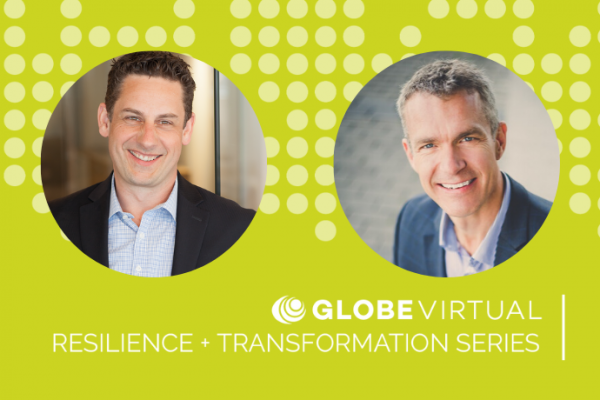GUEST CONTENT
The world is undergoing a paradigm shift from profit maximization to value optimization. To deliver long-term value, companies need to manage potentially conflicting targets and trade-offs. Companies are reporting not just on financial returns, but also on environmental and social targets.
The Value Balancing Alliance (VBA) was founded to further standardize existing approaches in sustainability accounting. The objective is to arm decision-makers with consistent and robust information to make more informed decisions and steer companies towards sustainable and inclusive business models. The VBA members—international companies from various sectors—have successfully tested the first version of the methodology. The results will enable stakeholders to have a better understanding of the true value of a company.
Leaders from VBA and its member organization and founding member in Canada, BASF, joined GLOBE Capital to challenge Canadian business leaders to spearhead economic transformation in the Americas.
To learn more about what makes VBA different and how Canadian companies can get involved, we spoke with VBA CEO Christian Heller and Thilo Birkenheier, BASF Canada CFO and Director of Business Services.
How is VBA redefining the concept of creating value for businesses around the world?
Christian Heller: Contrary to the current international landscape which focuses on reporting and disclosure, VBA focuses on developing methodologies and tools to integrate sustainability into decision-making. The concept of ‘double materiality’ is growing in dominance around the globe. It requires companies to assess two things.
Firstly, how do sustainability aspects inform and influence enterprise value? For example, climate patterns may impact where a company builds a new site. Sustainability can also affect enterprise value through intangible aspects like diversity or reputation.
Secondly, what value does this business create for society, the environment, and the wider economy? This is called an externality assessment and requires you to examine how your business affects third parties. To this effect, we’re currently developing new methodologies to assess companies’ true value to society across the complete value chain. For example, VBA is reassessing how to account for wages and taxes. These have traditionally been seen as deductions from profits. However, if you consider the value contribution to society, wages are our purchasing power and taxes enable the government to provide infrastructure that supports our business, including streets, legal systems, healthcare, and education. By introducing this more holistic perspective, it can transform our understanding of a company’s value.
Thilo Birkenheier: You asked how VBA is redefining the concept of creating value. I would say it’s significantly broadening it. As Christian said, historically, companies have really focused on financial value creation, e.g. maximizing EBITDA. Now with VBA, we can consider environmental and social contributions as well.
What is the greater problem that VBA is aiming to solve?
CH: It’s a bit political. The broader challenges in our society—climate change, biodiversity, and social insecurity to name a few—affect businesses directly. The political framework in recent years has failed to address these concerns. We need to find smart solutions to integrate climate change and social challenges into a broader political framework. Net-zero commitments and the Sustainable Development Goals are a good start.
However, at VBA, we’re convinced the market economy is the best system to increase wealth and innovation in order to find solutions for these challenges. As we adopt new regulation, we need to ensure we’re employing a market-based logic. This is where VBA comes in. Alongside our partners, we’re providing a methodology to measure performance that takes society’s broader challenges into account.
TB: For BASF, we rely on VBA to help us make environmental and social impacts measurable in a way that is comparative to financial impacts. It’s tough to compare financial targets to emission reductions calculated in tonnes of CO2. Without adequate comparison, you can’t maximize the whole system. VBA provides a framework to make all targets comparable in US dollars.
To give a very concrete example, imagine you have the option to adopt a new technology that will change your feedstock from conventional to renewable, which will reduce your carbon footprint, but also increase your land use. How do you make a decision? VBA gives you a framework where you can compare finances, carbon emissions, and land use, allowing you to make a decision that maximizes your impact on society and not just financial returns.
How does VBA relate to other sustainability accounting frameworks, e.g. TCFD, SASB, etc.?
CH: We need to differentiate reporting frameworks and performance measurement methodologies.
In terms of reporting, the IFRS Foundation has established an International Sustainability Standards Board. The content for this board will be provided by the Value Reporting Foundation, which is a merger of SASB and IRCC that took place in June. We also expect to see the more climate-related reporting frameworks like CDP and CDSB moving in this direction. In short, the reporting landscape is consolidating. It’s also growing rapidly through the global adoption of taxonomies—classification systems that assess the impact of business activities on sustainability performance.
VBA is working on another layer—how to measure performance. We’ve got top notch partners on our side including the Volt Business Council, CERES, Harvard, and Oxford. To give a practical example, the reporting frameworks may require companies to report about human capital. This will likely mean considering training, but the frameworks may not go into detail on how to report or measure the impact of training. Without consistency, you can’t compare. If your performance isn’t comparable, your stakeholders can’t really use the information you’re providing.
What are the business rewards of adopting VBA?
TB: It’s clear that sustainability is at the core of the future of business. That is why we believe that, in order to be successful in the long term, BASF has to be able to show our stakeholders that we have a positive contribution to environment, society, and the economy. As Christian illustrated, we need to develop transparent language to assess that contribution.
The other business reward for us is direction on resource allocation. BASF is a complex global company and determining which resources to use across different projects and countries is challenging. We know how to solve this problem by focusing on financial returns, but we want to broaden our assessment to include society and the environment and VBA helps us do that.
CH: To add to what Thilo said, the VBA methodology is a brand-new approach to materiality metrics. It allows companies to identify both where they have the highest risk exposure and where they have the biggest business opportunities. In the past, companies have relied on stakeholder interviews, which can be biased. VBA provides a measurement framework that is more objective.
The second benefit I’d like to introduce is risk management. In our methodologies, as Thilo mentioned, we bring everything down to US dollars. But this dollar amount doesn’t signify market price. It’s the value we’re attributing to a tonne of CO2, for example. In that case, the amount would be derived from the total cost of climate change to society. We’re currently valuing a tonne of CO2 at $100 CAD. This cost is a risk indicator or an internalization of externalities. Canada is ahead of the world in implementing a carbon price, which can be a valuable tool for businesses. We expect the rest of the world to follow suit in the coming years. In the meantime, a global company like BASF needs to take the cost of carbon emissions into account at a global scale. VBA provides the tools to do that.
Lastly, policymakers around the world are creating new standards, frameworks, and legislation. In response, business needs to provide and demonstrate solutions. Companies that engage in initiatives like VBA will be seen as front runners, and they’ll have insight into future standards, which will ultimately be a competitive advantage.
To that point, Thilo, it seems that BASF’s support for VBA isn’t just risk management, but also a strategic move. Could you speak more to that?
TB: Our VBA membership shows stakeholders that BASF is contributing to a sustainable future, which is one of our competitive advantages. Our customers want to work with companies that help them become more sustainable at the same time that regulators want to understand our contributions to society and the environment. VBA is the perfect tool to increase our transparency with both of these groups of stakeholders. As the saying goes, you can’t manage what you can’t measure.
One other aspect that VBA contributes to is employee attraction and retention, because nowadays people want to work for companies that have a positive impact on the environment and society. In this sense, VBA allows us to showcase our achievements and, thus, increase employee engagement.
Christian, for those unacquainted with VBA, where should they start?
CH: First of all, I recommend that companies consider the current economic transformation. All businesses will need to find ways to cope with this. VBA can provide insights in this area. To learn more, individuals should feel free to reach out to us directly.
VBA members get direct access to the methodologies we are developing. We are practitioner-led, so every member company has a say in the development of the methodologies. Secondly, membership isn’t just discussion-focused. We’re testing and piloting the methodologies by applying them to member businesses and members regularly share benefits and challenges with one another. This is much more efficient than trying to apply the methodologies in a vacuum or by working with a consultancy.
TB: When you first look at this topic, it can be a bit overwhelming. The key is to start now. If you wait another 3-4 years, VBA and similar impact calculations will start becoming mandatory. Then, you’re in a catch-up game.
Why is VBA critical in the race to net zero?
CH: It goes beyond net zero. Businesses have optimized all decision-making processes along profit maximization. At the international level, we’re just starting to add climate into the equation. However, other concerns like biodiversity and social inequality are not broadly incorporated into business decisions. If you want to optimize a company’s value contribution to society, you need to consider many more indicators than just net zero.
Why is that critical? Firstly, as Thilo mentioned, you can’t manage what you can’t measure. Secondly, competition benefits everyone. Once the market has comparable data, it creates a race to be the best. If we have consistent data, companies will improve much more quickly than they do today.
TB: I agree it goes beyond a net-zero target. VBA helps you to not make mistakes while racing to net zero. You could maximize that target alone and then have many negative ripple effects. The art of future business is to take a holistic approach—economic, social, and environmental. Companies need to find an optimum within all those aspects while reducing CO2 emissions.
How did GLOBE Capital accelerate action?
CH: VBA is currently working on enabling a fundamental transition of the economy. This can’t be done by one country, one policymaker, or by one alliance. We need to move the whole system. This means beginning with a broad stakeholder engagement that will eventually become collaboration. GLOBE Capital enabled VBA to position itself in the Canadian market and the financial market in particular. The finance sector will be a multiplier and enabler of the transition, allocating capital to certain trends and industries. If we can enable capital allocation to transformational technologies and companies, this is going to be the major step forward.
TB: VBA will grow as standards are established, which requires broad buy-in. We need to generate public interest. I’m hopeful that Canadian companies will join VBA in order to impact its direction and also to adopt the methodologies, so we can define this language both internationally and within Canada, and ultimately maximize the benefit for society, the environment, and all of us.




